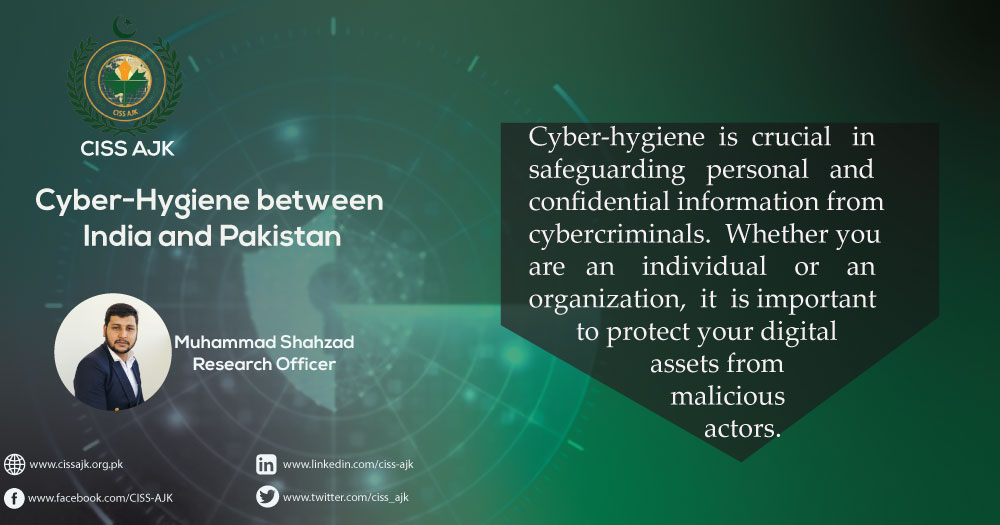784
In today’s digital age, the internet has become an essential part of o-ur daily lives. We use it for communication, entertainment, shopping, and even work. However, with the increase in online activity, there is also a rise in cybercrime. Cyber-hygiene is a set of practices that individuals and organizations can implement to protect themselves from online threats. This can include regularly updating software and operating systems, using strong passwords, and being vigilant against phishing and other types of cyber-attacks. It also includes best practices like creating backups of important data and segregating sensitive information. The overall goal of cyber-hygiene is to reduce the risk of cyber incidents and to quickly detect and respond to any that do occur.
Cyber-hygiene is crucial in safeguarding personal and confidential information from cybercriminals. Whether you are an individual or an organization, it is important to protect your digital assets from malicious actors. Implementing proper cyber-hygiene practices can help you ensure that your devices, networks, and data are secure. Cyber-hygiene helps in mitigating the risks of cyber-threats such as malware, phishing, and hacking.
India and Pakistan have had a long-standing tension in their relationship, and this extends to the cyber domain as well. Both countries have been known to engage in cyber-espionage, cyber propaganda, and other cyber activities against each other.
India and Pakistan both have reported cyber attacks on government institutions, infrastructure, and private companies from other countries. Reports suggest that these attacks are being carried out by state-sponsored actors or non-state actors with links to the governments.
Cyber-hygiene is crucial in today’s digital age. Whether you are an individual or a business, implementing proper cyber-hygiene practices can help you protect your devices, networks, and data from cyber threats. By maintaining strong passwords, keeping software updated, avoiding suspicious links and attachments, and using antivirus software, you can mitigate the risks of cybercrime. Cyber- hygiene should be implemented regularly and improved upon as needed to ensure the security of your digital assets.
Both countries have been criticized for having a lack of cyber-hygiene in their networks, systems, and infrastructure. Reports suggest that Indian and Pakistani government networks and systems are often inadequately secured and maintained, which can make them vulnerable to cyber-attacks. Additionally, a lack of cyber laws and regulations and insufficient cyber-security resources in both countries may lead to a lack of capacity for cyber defense and investigations. Overall, lack of cyber-hygiene is a major concern between India and Pakistan as it can increase the risk of successful cyber attacks, which can potentially have significant consequences on national security, the economy, and public welfare. Cyber-hygiene is crucial for the digital economy and businesses as well. Cybercriminals often target businesses to steal sensitive data, disrupt operations, or demand ransom. By implementing cyber-hygiene practices, businesses can protect their networks, devices, and data. They can also train their employees on how to identify and report suspicious activity. Some additional cyber-hygiene practices that businesses can implement include: Conducting Regular Security Audits: Regular security audits can help businesses identify vulnerabilities in their systems and implement measures to address them. Implementing Multi-Factor Authentication: Multi-factor authentication adds an additional layer of security to your login process, making it more difficult for hackers to gain access to your accounts. Encrypting Sensitive Data: Encrypting sensitive data can make it more difficult for cybercriminals to steal or access it. Creating a Cyber-security Incident Response Plan: Businesses should have a plan in place to respond to cyber-security incidents. This plan should include steps to contain the incident, identify the cause, and implement measures to prevent future incidents. There are several essential cyber-hygiene practices that you should follow to protect yourself from cyber threats. These include: Maintaining Strong Passwords: Passwords are your first line of defense against cyber threats. It is important to use unique and complex passwords and change them periodically. Avoid using easily guessable passwords such as your birthdate, name, or pet’s name. Keeping Software Updated: Software updates often contain security patches that fix vulnerabilities that hackers can exploit. Keeping your software updated can help you protect your devices and data from cyber threats. Avoiding Suspicious Links and Attachments: Cybercriminals often use phishing emails to trick users into clicking on malicious links or downloading infected attachments. It is important to avoid clicking on links or downloading attachments from unknown sources. Using Antivirus Software: Antivirus software can protect your devices from viruses and other malicious programmes. It is important to keep your antivirus software updated and run regular scans to detect and remove any threats. Cyber-hygiene is crucial in today’s digital age. Whether you are an individual or a business, implementing proper cyber-hygiene practices can help you protect your devices, networks, and data from cyber threats. By maintaining strong passwords, keeping software updated, avoiding suspicious links and attachments, and using antivirus software, you can mitigate the risks of cybercrime. Cyber- hygiene should be implemented regularly and improved upon as needed to ensure the security of your digital assets.



